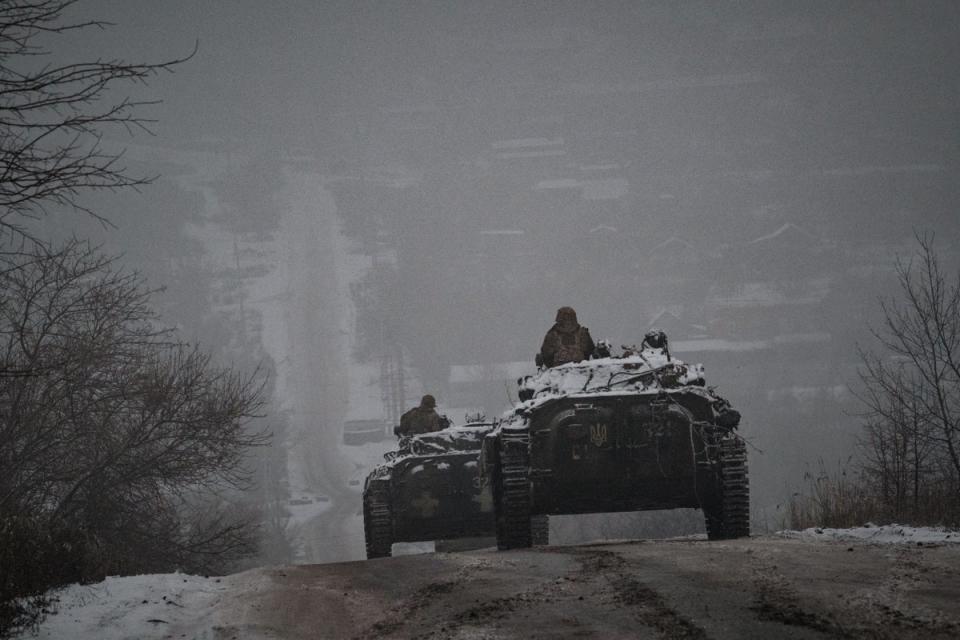Putin’s army may make ‘local gains’ in Ukraine but no ‘significant breakthrough’

Vladimir Putin’s troops may make “local gains” in a heavily fought over province of Ukraine but are unlikely to achieve an “operationally significant breakthrough,” British defence chiefs said on Tuesday.
They believe that Russian military chiefs are seeking to open up a “new axis of advance” in the Donetsk area of the eastern Donbas region.
The move appears to be aimed at “diverting” Ukrainian forces from the town of Bakhmut, which Putin’s army is seeking to seize, they added.
In its latest intelligence briefing, the Ministry of Defence said: “In the last three days, Russia has likely developed its probing attacks around the towns of Pavlivka and Vuhledar into a more concerted assault.
“The settlements lie 50km (31 miles) south-west of Donetsk city, and Russia previously used the 155th Naval Infantry Brigade in an unsuccessful assault on the same area in November 2022.
“Elements of the 155th are again involved as part of an at least brigade sized force which has likely advanced several hundred metres beyond the small Kashlahach River which marked the front line for several months.”
The updated added: “Russian commanders are likely aiming to develop a new axis of advance into Ukrainian-held Donetsk Oblast, and to divert Ukrainian forces from the heavily contested Bakhmut sector.
“There is a realistic possibility that Russia will continue to make local gains in the sector. However, it is unlikely that Russia has sufficient uncommitted troops in the area to achieve an operationally significant breakthrough.”
While there was no sign of a broader new Russian offensive, the administrator of Russian-controlled parts of Ukraine’s eastern Donetsk province, Denis Pushilin, said Russian troops had secured a foothold in Vuhledar, a coal-mining town whose ruins have been a Ukrainian bastion since the outset of the war.
Pushilin said that despite “huge losses” Ukrainian forces were consolidating positions in industrial facilities.
He added that Ukrainian forces were throwing reinforcements at Bakhmut, Maryinka and Vuhledar, towns running from north to south just west of Donetsk city.
The Russian state news agency TASS quoted him as saying Russian forces were making advances there, but “not clear-cut, that is, here there is a battle for literally every metre.”
Ukrainian military analyst Oleh Zhdanov said Ukraine still controlled Maryinka and Vuhledar, where Russian attacks were less intense on Monday.
Pushilin’s adviser, Yan Gagin, said fighters from Russian mercenary force Wagner had taken partial control of a supply road leading to Bakhmut, a city that has been Moscow’s focus for months.
A day earlier, the head of Wagner said his fighters had secured Blahodatne, a village just north of Bakhmut, although Kyiv said it had repelled these assaults.
In central Zaporizhzhia region and in southern Kherson region, Russian forces shelled more than 40 settlements, Ukraine’s General Staff said. Targets included the city of Kherson, where there were casualties.
The Russians also launched four rocket attacks on Ochakiv in southern Mykolaiv, the army said, on the day Volodymyr Zelensky met the Danish prime minister in Mykolaiv city, to the northeast.
Both Russian and Ukrainian military chiefs are expected to launch spring offensives to try to get the upper hand in the conflict.
The Ukrainian president is urging the West to hasten delivery of its promised weapons so Ukraine can go on the offensive, but most of the hundreds of tanks pledged by Western countries are months away from delivery.
British Defence Minister Ben Wallace said the 14 Challenger tanks donated by Britain would be on the front line around April or May, without giving an exact timetable.
Kremlin spokesperson Dmitry Peskov said Western countries supplying arms leads “to NATO countries more and more becoming directly involved in the conflict - but it doesn’t have the potential to change the course of events and will not do so”.
The US-based Institute for the Study of War think-tank said “the West’s failure to provide the necessary materiel” last year was the main reason Kyiv’s advances had halted since November.
The researchers said in a report that Ukraine could still recapture territory once the promised weapons arrive.

 Yahoo Movies
Yahoo Movies 